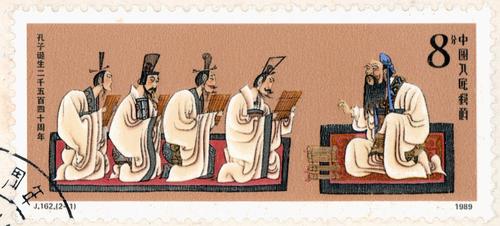There were many benevolent mothers in ancient China who paid special attention to their children’s education. The following are inspirational stories of two mothers who taught their children to be pure and honest.
Tian Ji’s Mother Refuses to Accept a Bribe of Gold
During the Warring States Period (453 - 221 B.C.), Tian Ji was the prime minister of the Qi State and he was known for his hard work and diligence.
One day, a subordinate of Tian presented him with a gift of 100 taels of gold so that he could be favored by Tian. [The Chinese tael refers to a unit of measure in the ancient Chinese system of weights and currency. One tael of silver weighed about 40 grams]. Tian refused the gift repeatedly but eventually accepted for diplomatic reasons. He returned home and forwarded the gift to his mother but his mother was outraged and scolded him, “This gold is worth more than your salary for the past three years as a prime minister! Have you robbed the gold from the people or have you accepted a bribe?”
Tian Ji lowered his head and told his mother what had happened. His mother responded to him solemnly, “I have heard that a learned man must govern his behaviors vigilantly, cherish his good name, and never take anything that does not belong to him. A learned man should have nothing to hide as he will not cheat or take advantage of others. A learned man will repel bad gestures and reject bribes. You carry the responsibility of the state’s administration, so you are supposed to set a good example for the people. However, now you have taken a bribe from one of your subordinates. You have cheated the duke and failed your people. You have truly broken my heart! You must return the gold right away and ask the duke for punishment!”
Tian Ji felt terribly ashamed of himself after hearing his mother’s admonishment. He immediately returned the gold and then went to the royal court to confess to the Duke of the Qi State of his wrongdoing. Tian told the Duke what his mother had told him and begged the Duke to accept his resignation. The duke praised Tian’s mother highly for her moral values. He told the entire court of officials, “A virtuous mother raises virtuous sons! Now that I know you have a virtuous mother, I no longer need to worry about corruption in my state. I shall pardon you for your misdemeanor.”
The Duke issued an imperial edict and ordered the entire state to learn from Tian Ji’s mother. Her emphasis on raising children with upright morals as the base for education left a deep impression on the duke. From then on, Tian Ji governed his behavior with an even higher standard.
Cui Xuanhui’s Mother Teaches Him to be Loyal and Uncorrupt
Cui Xuanhu was a high-level government official in the Tang Dynasty (618 - 907 A.D.) His mother once told him, “I’ve heard that when one’s child becomes a government official, you can tell if he is a good official if he leads a simple, frugal life and he must be a bad official if he is frivolous with money and leads a life of luxury. I could not agree more. I’ve noticed that many of our relatives provided their parents with lots of money, but their parents never asked them where the money came from. It would be good if the money came from their salaries. Otherwise, they would be no better than bandits. Even if these people did not commit such terrible crimes, I wonder how they can sleep at night. You are receiving a salary from the government. If you are not loyal, pure, and honest, how can you face Heaven?”
Cui Xuanhui followed his mother’s words closely. He was a loyal official and looked after the people in his state. He was later known as a very pure and honest official.
It is a Chinese traditional virtue to be honest, pure, and uncorrupted if you are a public servant. Parents set a good example for their children by governing their own speech, conduct and by guarding their own morality. In turn, children were inculcated with good moral standards. Parents were truly protective of and responsible for their children and raised them to be adults without any secrets.

